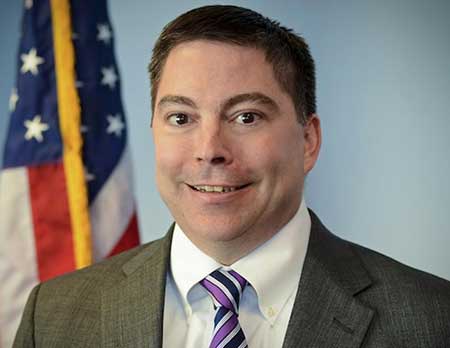O'Rielly Has Issues with Funding 5G Before Better Data
The smarter way to stay on top of the multichannel video marketplace. Sign up below.
You are now subscribed
Your newsletter sign-up was successful

FCC commissioners Michael O'Rielly voted in favor of a Notice of Proposed Rulemaking to start handing out billions of dollars for 5G, but said he has issues with doing so before the FCC collects better data.
That came in his statement about the vote at the FCC's April public meeting, held by socially distanced teleconference because of the COVID-19 pandemic.
The FCC voted to seek comment on a proposal to give out up to $9 billion over a decade for 5G buildouts, which is about $450 million per year more than the Universal Service Fund (USF) Mobility Fund allocation, which it is replacing. The extra money will also come from USF. The FCC will target rural areas that will be less likely to get 5G absent that support.
O'Rielly is all for expanding 5G, but as a former Hill staffer, O'Rielly is also keenly attuned to "intent of Congress" issues in implementing legislation.
O'Rielly said he has questions about the FCC's legal authority to proceed with funding before the FCC has produced mobile coverage maps as directed by the Broadband DATA Act.
"While there is possibly an argument that Option A complies with the strict letter of the statute, I wonder if proceeding in such a manner would be contrary to the spirit of the law," he said. "To add some color to the debate, moving ahead without new maps doesn’t seem to match up with my conversations with leading Congressional sponsors of the law prior to and following enactment."
A similar issue was raised about the FCC handing out money from its new Rural Digital Opportunity Fund before better maps were produced, but O'Rielly draws a distinction.
The smarter way to stay on top of the multichannel video marketplace. Sign up below.
"[U]nlike the Rural Digital Opportunity Fund (RDOF) proceeding which was already in motion prior to the passage of the Broadband DATA Act, the Rural 5G Fund mechanism appears to be within the ambit of a 'new award of funding' for which the FCC would need to use the statutorily-required maps."
He is also concerned about the item's seeming presumption that it no longer makes sense to use the Universal Service Fund advanced telecommunications subsidies for 4G LTE. He says that "may not be the best course of action if our goal is to target the unserved."
He is also concerned that using phase II of the fund for precision agriculture--President Donald Trump has talked up the need for broadband for farmers as recently as this week--"may not fit within the FCC’s expertise, or be properly targeted to those with the greatest need for 5G service or USF subsidies," irrespective of industry, though he ads that he is all for precision agriculture.
He had some other issues, but said that, overall, "it is certainly worthy of support at the NPRM stage, and I approve its adoption today."
Addressing the issue of transitioning the funding to 5G rather than supporting 3G or 4G, FCC Chairman Ajit Pai said in his statement that it did not make sense to support outdated tech and that he would not condemn rural residents to playing a continual game of catch-up.
Contributing editor John Eggerton has been an editor and/or writer on media regulation, legislation and policy for over four decades, including covering the FCC, FTC, Congress, the major media trade associations, and the federal courts. In addition to Multichannel News and Broadcasting + Cable, his work has appeared in Radio World, TV Technology, TV Fax, This Week in Consumer Electronics, Variety and the Encyclopedia Britannica.

